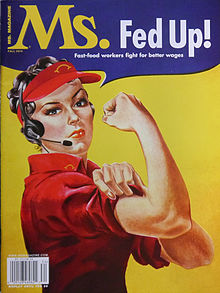The examples and perspective in this article deal primarily with the United States and do not represent a worldwide view of the subject. (October 2013) |
| Part of a series on |
| Human body weight |
|---|

Criticism of fast food includes claims of negative health effects, animal cruelty, cases of worker exploitation, children-targeted marketing and claims of cultural degradation via shifts in people's eating patterns away from traditional foods. Fast food chains have come under fire from consumer groups, such as the Center for Science in the Public Interest, a longtime fast food critic over issues such as caloric content, trans fats and portion sizes. Social scientists have highlighted how the prominence of fast food narratives in popular urban legends suggests that modern consumers have an ambivalent relationship (characterized by guilt) with fast food, particularly in relation to children.[1]
Some of these concerns have helped give rise to the slow food and local food movements. These movements seek to promote local cuisines and ingredients, and directly oppose laws and habits that encourage fast food choices. Proponents of the slow food movement try to educate consumers about what its members consider the environmental, nutritional, and taste benefits of fresh, local foods.
- ^ Robin Croft (2006), Folklore, families and fear: understanding consumption decisions through the oral tradition, Journal of Marketing Management, 22:9/10, pp1053-1076, ISSN 0267-257X